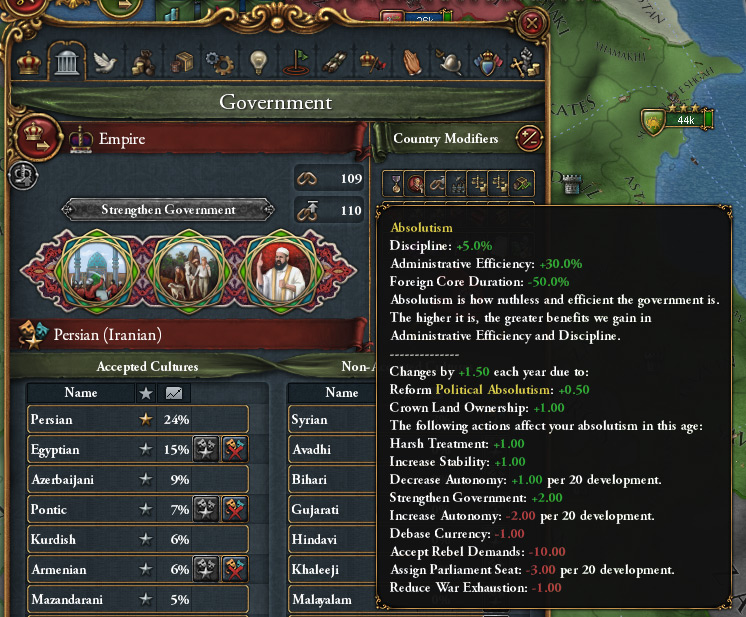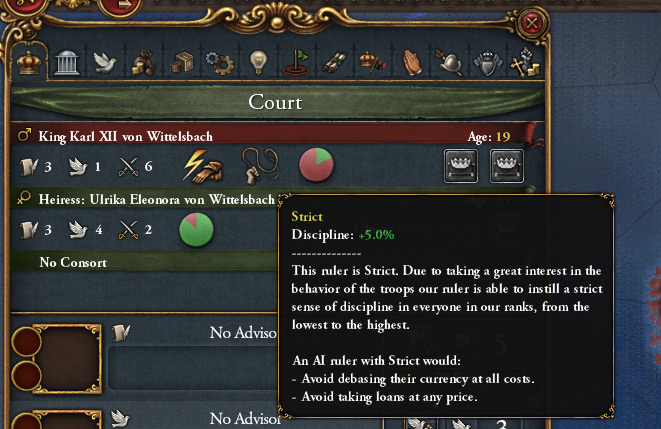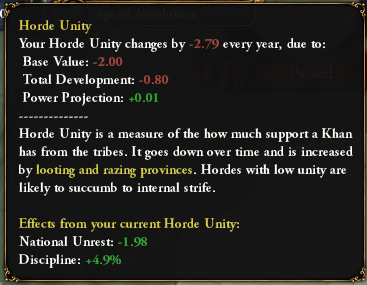And while sources of discipline might be plenty, they are for the most part exclusive to one another. While most religions provide discipline bonuses, you can only enjoy one of these bonuses at a time. Same goes for national ideas and government reforms.
Why is Discipline So Strong?
First things first: let’s cover the power of the modifier to understand why it’s so sought after. Discipline makes your whole army fight better, both offensively and defensively. You deal more damage and get dealt less damage, plain and simple. For reference, an increase to your military tactics (which are tied to your technology level) is often less powerful than getting 5% discipline. In fact, the defensive properties of discipline stem from increasing your military tactics. This increase is multiplicative on top of the additively increasing-with-time military tactics value. This makes discipline more important in the late game when your base military tactics value is higher. What else discipline does is increase the damage your troops deal. Offensively, it translates to an equal value of combat ability which applies to all your regiments. This means that discipline after MIL tech 13 (when artillery gets 2 pips and starts doing damage from the backrow) sharply increases in value, as the damage bonus starts applying to your backrow artillery on top of your frontline. Lastly, morale becomes less and less relevant in the EUIV late game. Battles are decided by casualties and manpower. Discipline indirectly impacts manpower, as you receive fewer casualties and inflict more to your opponent. Morale simply lets your troops fight longer.
Best Sources of Discipline
Now let’s explore what options exist out there to increase your discipline value.
#1: National Idea Sets
Many nations have discipline in their national ideas. There are too many to list, and it isn’t something you can directly impact. When forming a nation though, you can check its national idea set and compare it to your current one. You should always prioritize national ideas that provide discipline.
#2: Idea groups and Policies
There are only a few sources of discipline from idea groups. You should always aim for them, as they enhance your military capabilities by a lot.
Offensive idea 7, +5% discipline Full Quality ideas, +5% discipline Quality-Economic policy, +5% discipline
#3: Religion
Many religions provide a source of discipline. With most religions fleshed out, the ways these bonuses are provided differ in nature, but are always easy to get if you follow the religion. In more detail: Zoroastrian nations get up to +10% discipline from the Baku Atesgah monument in Shirvan. It’s the hardest of these modifiers to get, but also the most powerful one. Totemist nations get greater bonuses from their ruler personalities, meaning that a strict ruler (normally +5% discipline) will provide 10% instead. On top of that, traits of past rulers can be added to your ancestor slots, making the bonuses permanent. Doing that with the strict trait gives a +5% permanently. Hindu rulers can just choose Shakti as their personal patron deity. Among her bonuses is a +5% discipline bonus. On a new ruler’s ascension, go to the religion tab and choose a patron deity. You will get a notification for it, so you can’t miss it. Norse rulers can select Tyr as their personal patron deity. Among his bonuses is a +5% discipline bonus. Same process as the one for Hindu nations. Nahuatl, the native Aztec religion gets a +5% discipline bonus when a nation successfully passes the “Warrior Ranks” religious reform. Orthodox nations can commission the icon of St Michael to get a +5% discipline bonus, along with a bonus to manpower. Arguably the strongest religion in the game, discipline from the St Michael Icon certainly contributes to that title. Tengri nations get various bonuses depending on which religion they have as a syncretic faith. Choosing Shinto as a syncretic faith gives a nice +5% discipline bonus. Buddhist nations with a Karma between -33 and +33 get +5% discipline. Having less than -33 Karma gives +2.5% discipline instead. The native religion of Oceania can get a +5% discipline bonus through their “story” mechanic. Each new ruler chooses a new story among the ones unlocked. The Adnoartina story, unlocked after humiliating a rival, provides the discipline bonus along with a bonus to prestige from land battles. The protestant aspect “Holy Sacraments” provides +2.5% discipline. The customizable nature of the Protestant religion allows you to enable it whenever needed, while having another bonus active during times of peace. The Sikh religion can get +2.5% discipline if they choose the “Miri and Piri” teaching of Guru Har Gobind. The Guru can appear after 1606, and it’s the clear best out of the three bonuses he offers you. Fetishist nations enjoy +2.5% discipline from their ruler following the Mwari cult. The Mwari cult is native to southern Africa and the area of the Kongo. Making it the primary cult will double the bonus, but it will also make it harder to change out of it. Coptic nations can get +2.5% discipline through the “Will of the Martyrs” blessing. Controlling a Coptic holy site (or ensuring it’s controlled by another Coptic nation) allows you to pick one of 5 bonuses. This is one of the strongest ones.
#4: Miscellaneous Methods
A) Up to +10% from the Marathas estate (in Sourthern India), scaling with their land ownership B) Commandant advisor, +5% discipline C) Absolutism, scaling up to +5% discipline at 100 Absolutism D) Ruler with the Strict personality trait, +5% discipline E) Being a March with the “Send officers” interaction enabled from the overlord, +5% discipline F) An Aztec event before 1460 provides two choices, one of which gives +2.5% discipline G) Completing the “Establish the Black Guard” mission as Morocco, +2.5% discipline H) Completing the “Subjugate Siam” mission as Dai Viet, +2.5% discipline I) Certain special units enjoy an inherent discipline bonus (e.g., Banner units) or can get one through decisions and estate privileges (Revolutionary Guard)
#5: Government Reforms
A) Up to 10% at 100% militarization. The militarization mechanic is only available to the nations of Prussia, Zulu, and any nations formed by them. It is tied to these nations’ unique governments. B) Assimilating the “Lost cultures” culture group with the Mughals. Impossible in a normal ironman campaign. It gives +5% discipline if achieved. C) Steppe hordes gain up to +5% discipline at 100 horde unity. D) “Integration of the Sohei”, available only to theocracies who follow an eastern religion or have their capital in Japan with a Japanese or Ainu primary culture. It provides +5% discipline among a couple more military bonuses. E) Revolutionary Republics with the Girondist faction in power enjoy a +5% discipline bonus. F) “Governmental Purbias Register” gives Rajput regiments a +5% discipline bonus.
When Should You Focus on Discipline?
Short answer is always.
You should grab any and all discipline modifiers readily available to you.
Of course, it isn’t always worth it to extremely go out of your way for it (e.g., trying to get the Marathas estate for some discipline).
In general, during the early game, morale is supposed to be slightly more important. Battles are won by your troops staying and outlasting the opponent in a fight. This phase of the game doesn’t last long though.
Start working on unlocking ideas and accessing sources of discipline as soon as possible.
At the time of this writing (patch 1.33), discipline is arguably as good as morale in the early game. And assuming we don’t see any changes to how military engagements currently work, discipline is always superior to morale as a modifier.
Just make sure you aren’t completely out-morale’d and run out of the battlefield!
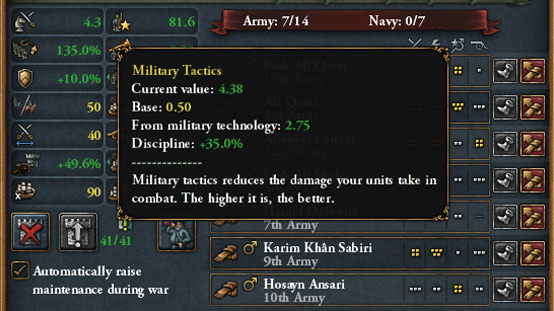
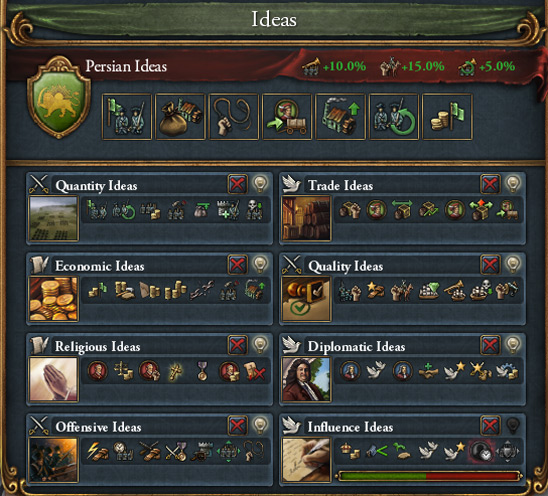
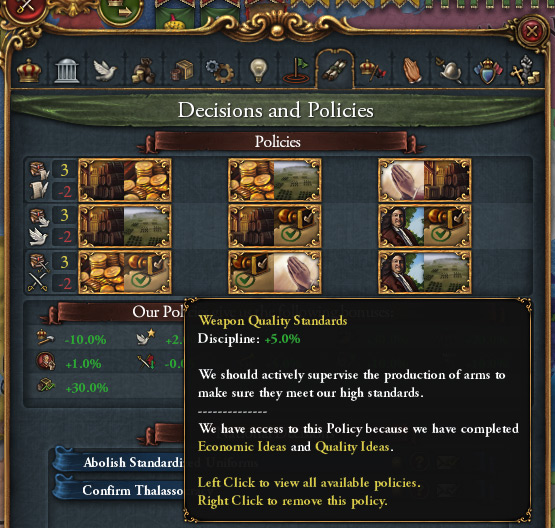
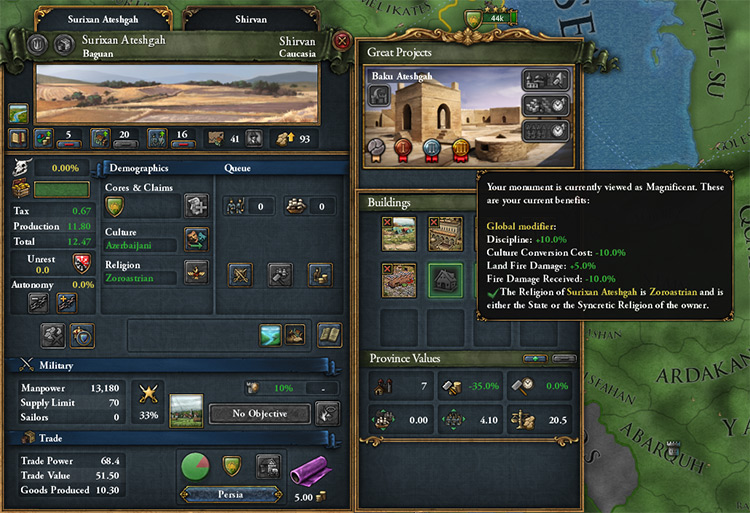
![]()

